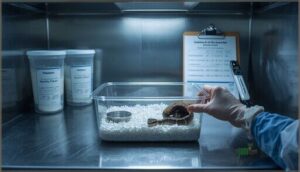This site is supported by our readers. We may earn a commission, at no cost to you, if you purchase through links.
A single wild-caught snake can carry parasite species that haven’t been documented in captive collections for decades—organisms your veterinarian may not even recognize under a microscope. The reptile trade moves animals faster than their parasites can be screened, which means your newest addition might arrive with hitchhikers that threaten your entire collection.
Prevention isn’t about reacting to mites crawling across glass or worms in fecal samples. It’s about controlling every entry point, from the breeder’s facility to your quarantine room, and understanding that parasites exploit gaps in biosecurity the same way water finds cracks in a foundation.
Your best defense starts before you bring a snake home and continues through every routine you build into your husbandry practices.
Table Of Contents
- Key Takeaways
- Choosing Healthy Snakes to Prevent Parasites
- Quarantine and Screening for New Snakes
- Maintaining a Clean Snake Enclosure
- Reducing Risks of External and Internal Parasites
- Supporting Snake Health for Parasite Resistance
- Frequently Asked Questions (FAQs)
- What causes parasites in snakes?
- What is the best way to prevent snake mites?
- How do I tell if my snake has parasites?
- What causes parasitism in snakes?
- What parasites do snakes eat?
- How do I protect my reptiles from parasites?
- How do you get rid of Worms in a snake?
- How do you treat septicemia in a snake?
- How can parasites be prevented?
- How do I know if my snake has parasites?
- Conclusion
Key Takeaways
- Parasites enter your collection through wild-caught snakes, contaminated feeders, and pet store animals, so sourcing captive-bred snakes from reputable breeders with documented fecal tests dramatically reduces your risk before problems start.
- Quarantine new arrivals for 30 days in dedicated enclosures with separate equipment, running fecal tests within the first week to catch mites and internal parasites before they spread to your established collection.
- Regular enclosure sanitation—replacing substrate every 6-12 months, disinfecting surfaces with reptile-safe products, and using color-coded tools for each habitat—breaks parasite life cycles and prevents cross-contamination between snakes.
- Strong nutrition, proper hydration, and annual veterinary fecal exams build your snake’s natural parasite resistance, making prevention through routine care far more effective than reacting to infestations after they’ve taken hold.
Choosing Healthy Snakes to Prevent Parasites
Preventing parasites starts before you even bring a snake home. The right source and documentation can save you from months of treatment and stress down the road.
Here’s what to look for when selecting a healthy, parasite-free snake.
Buying From Reputable Breeders
When you’re ready to bring a new snake home, starting with a reputable breeder gives you the best shot at avoiding parasites from day one. Breeder verification and transparent reptile health and wellness records mean you won’t be flying blind—purchase agreements with health guarantees and snake certification back up their reputation.
- Documented fecal test results showing your snake is parasite-free before pickup
- Access to lineage or health history that reveals the breeding environment’s reptile care standards
- Clear quarantine procedures and reptile parasite control protocols the breeder follows
Experienced reptile keepers know that breeder reputation matters more than price, because a healthy start saves you headaches later. Ensuring the health of your snake also involves understanding the importance of scientific study summaries in veterinary care.
Avoiding Wild-Caught and Pet Store Snakes
Wild-caught and pet store snakes carry markedly higher parasite risk than captive breeding sources. Wild snakes harbor endemic reptile parasites rarely seen in controlled environments, while pet stores see high turnover and stress that compound concurrent infections.
Your snake sourcing decision directly impacts long-term reptile health and animal welfare.
Captive-bred stock from established breeders provides documented lineage and reduces biosecurity threats that complicate parasite prevention and snake care protocols.
Requesting Health and Fecal Test Documentation
Before finalizing your purchase, you should request detailed health certificates and fecal test results from accredited laboratories.
Proper documentation standards require dated reports on veterinary letterhead that specify parasite panels performed, test methodology, and laboratory accreditation status.
Ask your reptile veterinarian to review these records, verifying they address relevant stages of the parasite lifecycle and meet current diagnostic standards for reptile health and parasite prevention.
Quarantine and Screening for New Snakes
Bringing a new snake home is exciting, but it’s also the moment when hidden parasites can slip into your collection unnoticed. A proper quarantine period acts as your first line of defense, giving you time to spot problems before they spread.
Here’s how to set up an effective screening process that protects both your new arrival and your established snakes.
Isolating New Arrivals for 30 Days
When you bring a new snake home, think of quarantine as your first line of defense against parasites. Keep newcomers completely isolated for 30 days in a dedicated enclosure with separate equipment—this biosecurity measure prevents cross-contamination.
During snake acclimation, conduct health screening including fecal tests upon arrival, then monitor daily for changes in appetite, shedding, or visible mites to catch problems early.
Monitoring for Mite and Worm Symptoms
During quarantine, watch closely for telltale parasite screening indicators. Check daily for snake mites—tiny dark specks crawling on scales, especially around eyes and ventral surfaces.
Worm signs include abnormal feces, mucus, or weight loss despite eating. Schedule fecal analysis within the first week to detect internal parasites early.
Consistent health monitoring during this period establishes your baseline for effective mite treatment and parasite control throughout your reptile health management program.
Maintaining a Clean Snake Enclosure
A clean enclosure doesn’t just look better—it directly reduces parasite loads by removing eggs, larvae, and environmental reservoirs that allow infestations to persist. Regular sanitation breaks the life cycle of both mites and internal parasites before populations become established.
The following practices form the foundation of effective enclosure hygiene and parasite prevention.
Regularly Cleaning and Disinfecting Surfaces
You can’t expect to keep parasites at bay without solid surface sanitization. Regular cleaning protocols form the backbone of enclosure hygiene and biosecurity measures. Follow these steps to maintain disinfectant efficacy:
- Remove organic matter before applying any reptile-safe disinfectant to surfaces.
- Use diluted bleach or quaternary ammonium compounds at recommended ratios.
- Allow complete contact time before rinsing thoroughly.
- Let enclosures dry completely before reintroducing your snake.
- Assign dedicated cleaning tools to each enclosure to prevent cross-contamination.
Consistent enclosure cleaning reduces microbial load by 2–3 log units over several days, protecting your snake habitat from mites and pathogens.
Replacing and Sterilizing Substrate and Decor
Beyond surface cleaning, substrate replacement and decor sterilization form critical layers of parasite control.
Replace substrate every 6–12 months, or sooner if visibly compromised, to eliminate harbored mites and eggs.
Sterilize decor by soaking in 3–5% hydrogen peroxide for 10–15 minutes, then rinse thoroughly. Heat-treat porous items at 150–200°F for 30–60 minutes to inactivate surface parasites before reintroducing them into your snake habitat.
Preventing Cross-Contamination Between Enclosures
Think of your collection as a series of isolated ecosystems—each enclosure’s health depends on strict biosecurity measures. Cross contamination drives most multi-tank outbreaks, so your sanitation protocols must include:
- Dedicate separate tools, gloves, and towels to each enclosure
- Implement color-coded supplies to prevent mix-ups during routine care
- Sanitize hands thoroughly before moving between habitats
- Schedule systematic cleaning to eliminate parasite buildup on all surfaces
Quarantine procedures reinforce this barrier, ensuring enclosure design and management support animal welfare through proven husbandry practices and parasite control strategies.
Reducing Risks of External and Internal Parasites
Even with a spotless enclosure, parasites can still find their way to your snake through contaminated feeders, substrate, or simple bad luck. Your best defense combines early detection with targeted control methods that won’t stress your animal or create chemical risks.
The following strategies will help you recognize parasite problems quickly and address them using both natural solutions and veterinary-guided treatments.
Identifying Signs of Mites and Worms
You can catch parasite problems early when you know what to look for. For mite detection, check closely for small, moving specks near the vent or tiny bite marks on your snake’s scales—excessive rubbing signals mite infestation.
Worm symptoms include weight loss, bloody diarrhea, and visible segments in feces.
Regular snake inspection and health monitoring lead to accurate parasite diagnosis and effective parasite management in reptiles.
Using Natural and Safe Mite Control Methods
Natural control methods break the mite life cycle without harsh chemicals, giving you safe and effective mite control options that protect your snake. Organic treatments like Taurrus predatory mites target parasites directly, while strategic humidity control creates conditions unfavorable for reproduction—that’s natural pest control working in your favor.
- Dust diatomaceous earth lightly on enclosure surfaces for organic pest control that reduces surface mites
- Apply natural predators like beneficial mites to substrate following product guidelines for parasite prevention and control
- Use mite trapping techniques with regular vacuuming to disrupt habitats and lower populations naturally
Implementing Routine Deworming as Advised by Vets
While natural mite treatments protect your snake’s exterior, internal parasites demand a different approach—one guided by veterinary medicine and care.
Work with your vet to establish deworming schedules based on your snake’s species, age, and fecal test results. Proper deworming products dosed correctly address internal parasites effectively, and documenting treatment outcomes helps you track your snake’s health and wellness over time for ideal parasite control and treatment.
Supporting Snake Health for Parasite Resistance
A strong immune system is your snake’s first line of defense against parasitic infections. When you prioritize proper nutrition, hydration, and veterinary oversight, you’re building resistance from the inside out.
A strong immune system built through proper nutrition, hydration, and veterinary care is your snake’s first line of defense against parasites
Here’s how to keep your snake in peak condition to naturally fend off parasites.
Providing Species-Appropriate Nutrition
Your snake’s immune system depends directly on proper nutrient balance and dietary variety in reptile nutrition. You’ll want to match prey selection and feeding frequency to your species’ biology—appropriately sized rodents or other prey that support digestive health without causing obesity.
Rotate prey types when safe, and adjust portions as your snake grows. This foundation in animal husbandry strengthens natural parasite resistance through optimized snake care and maintenance.
Monitoring Hydration and Body Condition
Beyond proper nutrition, you’ll need to track hydration levels and body scoring to safeguard snake health and wellness. Check skin health by gently pinching—well-hydrated tissue springs back quickly.
Monitor weight management trends and verify water quality meets veterinary standards.
These reptile care and maintenance steps in animal health and wellness reduce stress that invites parasites, keeping your reptile health and wellness and snake care and maintenance on solid ground.
Consulting Herpetological Veterinarians Regularly
Routine veterinary guidance from a licensed reptile veterinarian transforms parasite testing from guesswork into evidence-based prevention. Annual health assessments catch helminths early, while customized treatment plans address species-specific risks and regional prevalence.
These veterinary medicine consultations strengthen biosecurity measures across your collection, document baseline reptile health and wellness, and support animal welfare and conservation goals—giving you control over threats before clinical signs ever appear.
Frequently Asked Questions (FAQs)
What causes parasites in snakes?
Poor prey, contaminated cages, and compromised immunity pave pathways for parasite transmission.
Infected feeders carry internal parasites, while dirty enclosures harbor mite infestations.
Environmental factors and host susceptibility determine your snake’s parasite control success.
What is the best way to prevent snake mites?
The best parasite prevention strategy starts with strict quarantine—isolate new arrivals for thirty days minimum.
Combine regular inspections with prompt substrate changes, veterinarian-guided mite control methods, and reptile-safe disinfectants to interrupt the mite life cycle effectively.
How do I tell if my snake has parasites?
Watch for visible mites near scales, excessive rubbing, weight loss despite eating, diarrhea, or lethargy.
Your vet can confirm reptile parasites through fecal tests and bloodwork, catching both external mite infestation and internal parasites early.
What causes parasitism in snakes?
Parasitism explodes when your snake encounters infected prey, contaminated substrates, or wild reptiles carrying mites, nematodes, or protozoa.
Poor host immunity and environmental factors accelerate parasite transmission, completing destructive parasite life cycles within vulnerable hosts.
What parasites do snakes eat?
Snakes don’t intentionally eat parasites for digestive health. However, they consume internal parasites like roundworms, tapeworms, and protozoa when prey items carry these organisms, inadvertently acquiring infections through parasite transmission in their natural diet.
How do I protect my reptiles from parasites?
Picture your reptile thriving in a clean, well-managed space.
You’ll protect it through routine veterinary fecal exams, strict quarantine of new arrivals, consistent environmental hygiene, species-appropriate nutrition, and biosecurity measures that prevent parasite transmission effectively.
How do you get rid of Worms in a snake?
You’ll need a reptile veterinarian to prescribe anthelmintic treatment targeting specific helminths like nematodes.
Diagnostic fecal tests confirm worm species, guide proper deworming methods, and guarantee follow-up monitoring verifies treatment success and prevents reinfection.
How do you treat septicemia in a snake?
Seek immediate veterinary care for suspected snake septicemia. Your vet will conduct blood cultures, initiate antibiotic therapy, and provide supportive fluids.
Strict infection control prevents spread while monitoring ensures treatment effectiveness in reptile medicine.
How can parasites be prevented?
You’ll gain control through consistent reptile biosecurity: quarantine new arrivals, conduct routine snake health checks, maintain a parasite-free environment with regular cleaning, and implement targeted mite prevention methods alongside veterinarian-guided deworming snakes and parasite control strategies.
How do I know if my snake has parasites?
Watch for weight loss, abnormal feces, visible mites, lethargy, or vomiting—all signal possible parasite detection issues.
Schedule veterinary care for diagnostic tests like fecal exams to confirm internal parasites or reptile parasites and guide treatment.
Conclusion
The best parasite prevention feels invisible until something goes wrong—then every protocol you skipped becomes obvious. Learning how to prevent snake parasites means accepting that your routine matters more than your reaction speed.
Source healthy animals, quarantine rigorously, and clean with consistency that borders on obsessive. Your veterinarian can’t fix what biosecurity should have stopped.
Build habits that make parasite introduction unlikely, and you’ll rarely need to treat what you successfully excluded.













